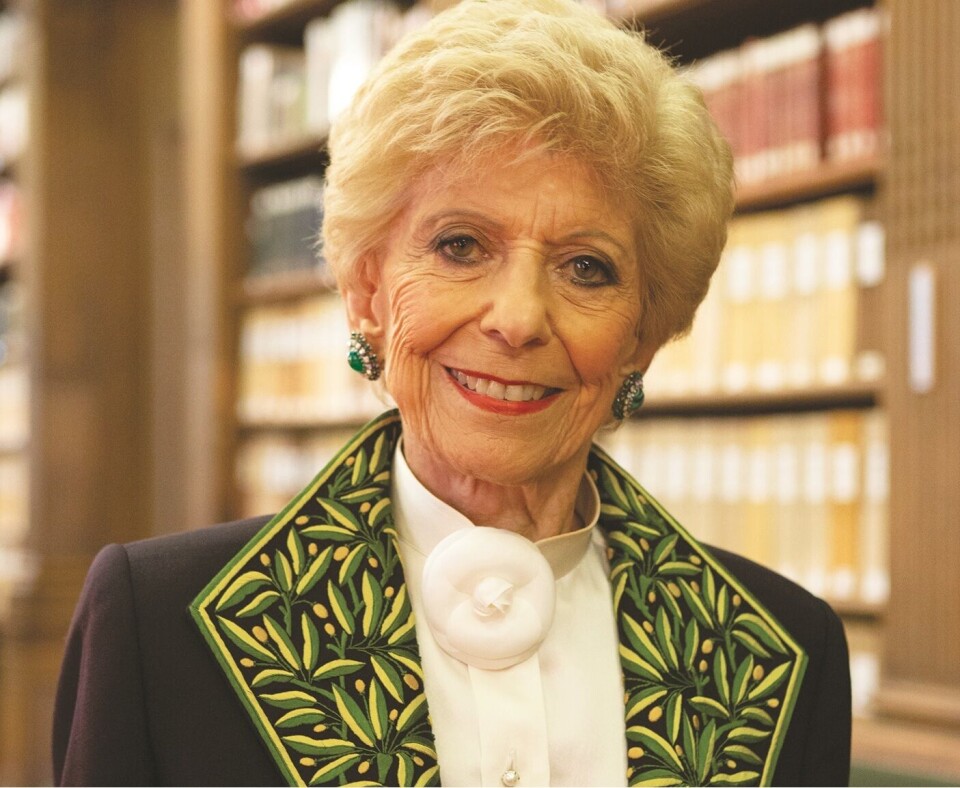-
‘Medical deserts’ major issue in upcoming local elections in France
Access to healthcare is now a more pressing concern than education, mayors say
-
‘Digital ID’ to be accepted at French airports this summer
Users of the France Identité app will be able to board certain flights using ID on smartphone
-
Germany to prolong EU border checks: how travel from France is affected
Checks at land borders will take place until at least September 15, 2026
First chairwoman of top language body Académie française dies at 94
Hélène Carrère d’Encausse recently told The Connexion she was not worried about anglicisms but did fear French was being abused and impoverished

The woman who chaired France’s top language guardians the Académie française for 24 years – after being only the third woman in its history to join – has died aged 94.
Hélène Carrère d’Encausse, whom The Connexion interviewed for our July editionat her Paris flat overlooking the Louvre, was respected in her Académie role as ‘perpetual secretary’ and was also well-known as a historian of Russia, often sought out by media for her expert commentary.
Born in Paris in 1929 to immigrant parents, she was stateless until taking French nationality in 1950, aged 21. She later described herself as “a case of perfect integration” saying “in my identity I feel French but I have two cultures”.
Her family, from Georgia, had fled after the Russian Revolution and the invasion of Georgia by the Bolsheviks (her father was Georgian and her mother Russian-German). Her father, known to have acted as an interpreter for the Germans during World War Two, ‘disappeared’ after the liberation of France.
Mrs Carrère d’Encausse’s son, Emmanuel, revealed the family tragedy in a 2007 book, which described how his grandfather was taken away by strangers and never seen again.
She went on, however, to brilliant studies, gaining a literature doctorate and teaching history at the Sorbonne and Sciences Po. She was also the author of some 30 books, including biographies of Lenin, Stalin and Catherine the Great, as well as the bestselling l’Empire éclaté (1978) in which she predicted the break-up of the Soviet Union. She was elected to the Académie in 1990 and received many honours, including the top ‘Grand-croix’ level of the Légion d’honneur.
Mrs Carrère d’Encausse loved Russia and argued that it was important for Europe to help to integrate the country after the break-up of the USSR. She had on occasion defended Vladimir Putin as a patriotic Russian seeking to restore the country’s dignity though adopted a critical position after the war in Ukraine.
In our recent interview, she stated she had not anticipated the war, but “knew that Europe had not found peace with Russia following the downfall of the USSR”.
As perpetual secretary of the Académie, she chaired its meetings and held the institution's highest role. Founded in 1635, its job is to monitor the evolution of the French language and give guidance on good usage, though it does – very slowly – change with the times where necessary.
It produces a dictionary, with the eighth, from 1935 still the last complete one. The ninth is up to the letter ‘S’ and is expected to be finished in two years’ time.
She agreed when the Académie, usually conservative, officially disapproved of new tendencies to feminise job titles in the late 20th century. However, more recently it relented unanimously, accepting the use of words such as ambassadrice instead of ambassadeur.
Read more: Should the French language be changed to be less masculine?
She also told The Connexion how the Académie now, for example, recognised the fact that “marriage no longer means ‘the union of a man and a woman’ but ‘the union of two people’”.
She said she hoped to see more women joining the Académie, which is still male-dominated (including her, there were seven women out of 40 Académie seats).
Even so, she still used the masculine form Mme le secrétaire perpétuel, and not la secrétaire perpétuelle, arguing that it was the job’s function that was important and that it is unnecessary for it to change with the gender of the person holding it.
She told us she did not worry much about anglicisms, as French and English had always borrowed from each other, but she did fear that French, which should be “precise and clear”, was becoming more misused and impoverished.
The Elysée said in a statement that a national ceremony of homage to Mrs Carrère d’Encausse will be held "before the end of the summer" at Les Invalides.
President Macron referred to her “exceptional destiny, characterised by love for our country, its language and culture”.
Related articles
French language puzzle: How to refer to an ambassadrice’s husband?
Briton Sir Michael Edwards becomes first Britons to join Académie française
























